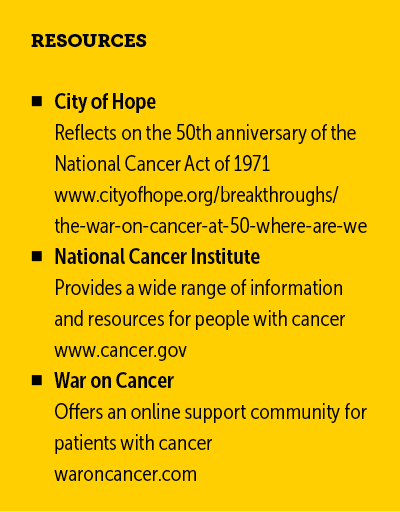Is Oncology Really for Me?
As I enter into my last year of nursing school at the University of Maryland School of Nursing in Baltimore, I am asked many times, “What area of nursing do you want to go into?” Although this question can be very daunting for most, the hardest question that I am constantly mulling over is, “Do you want to stay in oncology after you graduate?” I currently work as a student nurse on an inpatient oncology unit, and I see the ups and downs that oncology nurses face every day.
Jump to a section
As I enter into my last year of nursing school at the University of Maryland School of Nursing in Baltimore, I am asked many times, “What area of nursing do you want to go into?” Although this question can be very daunting for most, the hardest question that I am constantly mulling over is, “Do you want to stay in oncology after you graduate?” I currently work as a student nurse on an inpatient oncology unit, and I see the ups and downs that oncology nurses face every day.
Like many, my passion for oncology nursing began with a personal experience with cancer. After my mom was diagnosed with stage IV breast cancer, it was as if everything came to a standstill. Like most people living with cancer, my mom had to adjust to a new normal. Even still, my mom has never let her diagnosis define who she is. Various chemotherapy treatments accompanied hair loss, tears, and a general distaste for the hospital. However, the most surprising thing that came from my mom’s treatment journey was the inspiration I found through her nurses. These nurses provided compassion and insight when we needed it most. Whether it was a laugh or a helping hand, my mom’s nurses went above and beyond to ensure her comfort and made sure she was listened to every step of the way.
The way they cared so deeply about someone they had never met gave us the comfort of knowing that my mom was in good hands. It was through witnessing my mom’s tenacity and her nurses’ compassion that I finally decided what area of nursing I wanted to go into. I decided I wanted to be an oncology nurse when I graduate.
My passion led me to pursue a student nurse job on an oncology unit where I have learned so much about this illness, its patient population, and even myself. However, it was only after I really dove into this position that I started questioning, “Is oncology really for me?”
I went into my job knowing that I wanted to make a difference in my patients’ lives, but I had no idea the effect that they would have on me. Those who work in oncology, particularly those who have personal experiences with cancer, know that it can take a toll on you. As months went by, I found that it was increasingly difficult to build relationships with patients and their families only for them to receive bad news once again. It was even more difficult not to think of myself in the position of one of those family members being with my loved one in the hospital. I would come home from work debating if I was truly cut out for this. Would I be able to be a good nurse to my patients if I could not handle this?
Self-doubt began to creep in, but, thankfully, it was not there to stay. It was not until one day when I was discharging my patient finishing up her chemotherapy that I was able to see the positive effect I could have on my patients. She began to cry and thanked me for all that I had done, even if I did not think it was much. It was in that moment that I knew—she was able to see in me what I saw in my mom’s treatment team.
I have since taken so many important lessons that my mom and my patients have taught me and instill them into my current work and future practice as a nurse. Whether it is offering them another blanket, giving them an ear to talk to, or telling a corny joke to distract from their chemotherapy infusion, I know that if I can do the smallest thing to make my patients’ day better, then that is all that matters. I know that working in oncology will not be an easy feat, but at the end of the day, when I can give my all to my patients, it will be worth it.
People tell me that what I do is amazing and that they could never work in oncology. Some days, I could be convinced that maybe I am not cut out for this. However, I am constantly reminded that those days are few and far between. The amazing days far outnumber the bad ones. It will be a struggle to find myself as a future nurse in this specialty, but I am lucky to be surrounded by such amazing patients and an even better role model—my mom. So, is oncology right for me? I cannot think of a better fit. 
About the Author(s)
Sarah McCluskey is a student in the School of Nursing at the University of Maryland in Baltimore. McCluskey can be reached at smccluskey@umaryland.edu, with copy to CJONEditor@ons.org.




